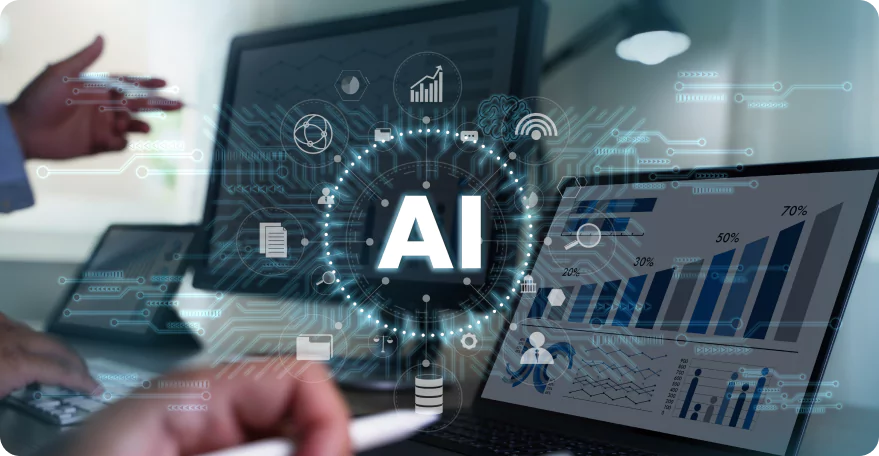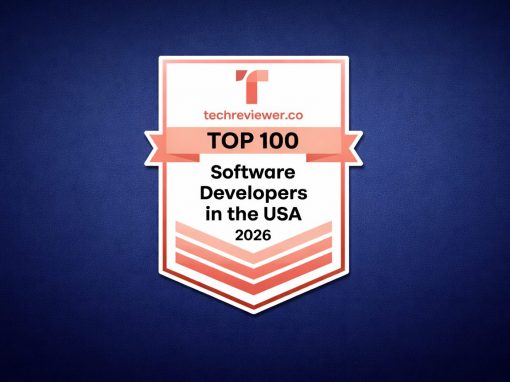Table of Contents
From self-driving cars and intelligent chatbots to the birth of ChatGPT, AI technology has achieved some major breakthroughs in recent years. Additionally, AI software is growing in popularity, with about 35% of businesses using AI technology in their everyday operations in 2022. And all this thanks to the advances in AI software development.
Let’s shine some light on what AI in software development is, the AI software development process, the opportunities, challenges, and more.
What is Artificial Intelligence Software Development?
AI software development is the process of designing, developing, and deploying software that has AI-powered features. These features help the program mimic human behavior and thought processes.
AI software developer experts make this possible by using various programming languages and frameworks that help create intelligent software systems.
AI software development is more complex than traditional software development as it relies on massive amounts of data to teach the program how to do things (e.g., recognizing language and images). This allows AI software to improve over time as it learns from this data.
Applications of AI Software
AI software development is the process of designing, developing, and deploying software that has AI-powered features. These features help the program mimic human behavior and thought processes.
AI software developer or AI Web developer experts make this possible by using various programming languages and frameworks that help create intelligent software systems.
AI software development is more complex than traditional software development as it relies on massive amounts of data to teach the program how to do things (e.g., recognizing language and images). This allows AI software to improve over time as it learns from this data.
Applications of AI Software
 Did you know that around 91% of businesses invest in AI software?
Did you know that around 91% of businesses invest in AI software?
That’s because AI helps employees increase their productivity and allows consumers to have a better customer experience.
 Did you know that around 91% of businesses invest in AI software?
Did you know that around 91% of businesses invest in AI software?
That’s because AI helps employees increase their productivity and allows consumers to have a better customer experience.
Here are a few ways in which AI-powered software is used:
Personalization:
Streaming services like Spotify and Netflix use powerful personalization AI algorithms. This way, service providers can make accurate content recommendations that align with user preferences.
Fraud detection:
AI is widely used in the finance and e-commerce industries to detect and prevent fraud. For instance, Stripe’s payment platform stands out as an example of AI in finance since it uses adaptive machine learning to assess every transaction for fraud risk.
Natural language processing:
ChatGPT, Google’s Siri, and Amazon’s Alexa use natural language processing. This allows them to understand what the user wants and respond accordingly.
Chatbots:
With the help of chatbots, many businesses are improving their customer support. With AI-driven chatbots, customers can get assistance instantly, 24/7.
Sentiment analysis:
As AI can comprehend the tone of sentiment in text, AI-based software (like Hootsuite and Sprout Social) can help analyze customer feedback and manage brand reputation.
Predictive analytics:
In software, AI analyzes large amounts of data and makes predictions based on it. This helps businesses and organizations to make more precise data-driven decisions. For example, Amazon uses AI to understand what product recommendations to put based on buyer preferences. Similarly, a survey on mergers and acquisitions found that about 72.6% of businesses plan to leverage technologies like AI and data analytics in their M&A processes to improve decision-making and drive long-term success.
Next, let’s see how AI software is built.
AI Software Development Process
Selecting the ideal dental practice software is a pivotal decision that can significantly impact your daily operations and overall patient experience, but with so many options available, how can you be sure which will be the best fit? To make the best choice, consider the following key factors:
Building AI software includes a few complex steps:
- Data collection:
First, the AI software developers collect relevant data from different databases. This data is then used to train the machine learning model.
- Cleaning and preparation:
At this stage, the data is cleaned from errors and duplicates. Then the data is processed into the right format so it can be repurposed for machine learning.
-
Algorithm selection and testing:
Here, developers test different algorithms and choose the one that’s most appropriate for the machine learning model.
- Model training and evaluation:
Next, the machine learning model is trained using the collected data. Then the developers evaluate the model’s accuracy and performance.
-
Deployment and monitoring:
If the machine learning model passes all tests, it is deployed and monitored to ensure it produces precise results continuously.

Challenges in AI Software Development
While AI software is constantly developing and improving, it also presents its own obstacles along the way. To create a seamless AI software solution, developers have to overcome a few challenges.
These include:
Data availability:
Obtaining the data that the AI software needs is a difficult task. Often getting high-quality data is hard and costly. Additionally, the developers need to clean the data and ensure it’s error-free before they feed it to the software.
Choosing the right algorithm:
Algorithm selection is a challenging step in the AI development process, as different algorithms perform differently depending on the dataset. Developers must also optimize models across multiple parameters, which adds to the overall complexity.
Integration with other systems:
Often, the AI software needs to be integrated with other systems. If these systems were not designed with AI in mind, the process could be even more difficult as it might require making major changes to those systems.
Software interpretability:
Developers also have to understand how the software makes decisions. The more complex the model, the more difficult it is to assess this.
Legal and ethical concerns:
AI software raises certain legal and ethical considerations. So, developers must take into account things like privacy, fairness, and accountability when creating AI programs, ensuring that they meet the requirements of a secure software development life cycle.
AI specialists’ shortage:
Currently, there’s a shortage of AI software developers, so it can be difficult to find experts who can build the AI software you need.
Opportunities in AI Software Development
The AI software development market is forecasted to grow to $602.4 million by 2026, making it a lucrative industry to tap into. More and more AI consulting firms are also emerging as the AI consulting market is projected to grow at a CAGR of almost 26.5% from 2022 to 2031.
Besides, this creates many new job opportunities for software developers specializing in AI.
Other opportunities in the AI software development field are:
Creating Innovative Solutions to Complex Problems
AI can help businesses and organizations create better and more innovative solutions to the challenges in their industries. For example:
- In marketing, AI can automate certain repetitive tasks and improve customer experience.
- In finance, AI can detect fraud, analyze large amounts of data, and identify investment opportunities.
- In healthcare, it can analyze medical data and improve patient outcomes by predicting diseases and suggesting accurate treatment plans.
- In real estate, AI can automate property management, optimize pricing, and provide predictive analytics for investment opportunities.
“At RedAwning, we’ve implemented AI-driven solutions across various facets of our business, from dynamic pricing algorithms that adjust rates in real-time to match market demand, to predictive analytics that help us identify high-performing properties. One of our standout applications has been AI-enhanced guest communication systems. These systems use natural language processing (NLP) to provide personalized, instantaneous responses to guest inquiries, significantly improving the booking experience and operational efficiency. For example, by integrating AI into our customer support, we’ve seen a 30% reduction in response times and a notable increase in guest satisfaction scores, demonstrating how small changes can have outsized impacts.
Moreover, AI has revolutionized our approach to market analysis. Instead of relying solely on historical data, we use AI to incorporate real-time inputs from competitor pricing, market trends, and even weather patterns to optimize pricing strategies. This approach has not only maximized revenue but also kept our properties competitively positioned in a dynamic market. A particular success story involved using AI to adjust prices during an unexpected surge in demand due to a local event, resulting in a 40% revenue boost that traditional models would have missed.
We conducted a pilot program using AI-driven dynamic pricing across a select portfolio of properties, and the results were compelling. The properties utilizing AI-based adjustments saw an average revenue increase of 25% compared to a control group that maintained traditional pricing models. Additionally, our AI-enhanced guest interaction system achieved a first-response resolution rate of 60%, well above the industry average. This not only improved the guest experience but also reduced operational costs by lowering the volume of support tickets requiring human intervention.”
– Tim Choate, CEO of RedAwning
Enabling New Experiences
AI constantly introduces us to new experiences and capabilities that were impossible before. Nowadays, we have access to virtual assistants, chatbots, and other advanced AI solutions (like ChatGPT and Midjourney).
All these solutions are only improving with time, ensuring we get a seamless, faster, and better experience.
Advancing the State-of-the-Art in AI Technology
AI can help developers make major breakthroughs in natural language processing, autonomous systems, and other AI building blocks.
This can help the industry accelerate AI software development as AI can help specialists explore new algorithms and improve their efficiency and performance.
Next, let’s get a more detailed overview of how exactly AI can help in software development.
6 Industries That Use AI Software
AI software is used in a wide range of industries as it helps create more efficient processes. Let’s check how AI software can help different industry experts:
Manufacturing
AI software can improve efficiency and reduce waste in various manufacturing processes.
For example, many industrial plants use AI-powered robots to automate repetitive tasks (such as assembly line work). AI software is also used to predict when industrial machines need to go under maintenance. This reduces downtime and optimizes productivity.
“It has been a game-changer on the manufacturing side of things as far as predictive maintenance goes. In that respect, we have integrated AI to monitor our assembly line machinery for predictions of impending failures before they occur. We have reduced unplanned downtime by 20% since implementation, saving us millions annually.”
– Alex Johnson, CEO of Man and Van Star
Retail
AI software is widely implemented in retail to improve customer experience and optimize workflows.
For instance, Amazon uses AI to understand what product recommendations to put based on the client’s purchase and browsing history. This has a positive impact on sales, inventory management, and customer satisfaction, creating positive outcomes for both parties.
“Our AI assistant, Huxley, analyzes client data to determine how we can optimize their key performance indicators like revenue or customer retention. For a retail client, Huxley suggested a hyper-personalized email campaign targeting customers based on purchase history and location. Open rates jumped over 40% and sales rose 15% week over week. Huxley now regularly provides insights to strengthen the client’s marketing and customer experience.”
– Victor Santoro, CEO/Founder of Profit Leap
Finance
Besides detecting fraud, AI automates and personalizes customer service in the financial industry. This way, AI chatbots can assist customers 24/7 with most of their basic financial needs.
For example, AI algorithms can analyze credit scores, predict credit risk, and even help investment banks handle some risk management processes.
“We use IBM’s Watson Assistant, an AI-powered virtual agent, to handle initial customer inquiries and schedule consultations. This has decreased response times by over 50% and allowed our staff to focus on more complex tasks.”
– David Pumphrey, CEO of Riveraxe
Transportation
AI is used to improve efficiency and safety in the transportation industry.
This allows self-driving vehicles to navigate different routes and make decisions in real time. AI also helps identify when a vehicle needs maintenance, helping prevent sudden breakdowns.
Healthcare
AI software can analyze patient data, which helps predict patient outcomes and reduce costs. For example, AI can identify the best patient treatments and analyze medical images faster and more accurately.
AI chatbots are also used in patient applications and portals and assist in making online appointments and booking consultations.
“For a major healthcare client, we implemented an AI assistant to streamline revenue cycle management. By analyzing historical claims data, the assistant provides real-time recommendations to improve billing accuracy and reduce denied claims. In the first 6 months, the number of denied claims fell by 30%, saving the client over $500,000.”
– David Pumphrey, CEO of Riveraxe
Agriculture
AI software is also increasing in popularity in the agriculture field. Artificial intelligence can help analyze soil quality and weather patterns. This allows farmers to plan better and optimize their yields.
Did you know AI drones are used to monitor crop health? This way, farmers can detect diseases and pest infestations and take preventative actions early on, saving most of their crops.

How to Choose a Reliable AI Software Development Company
Finding the perfect match when you’re looking for a professional AI software development company can be tough, even when after ensuring the AI readiness of your organization. It is also crucial to choose a reliable service provider you’re confident in, as this can impact the quality of your project.
Here are a few factors to consider when choosing such a company:
Experience:
Aim for companies that can showcase similar projects they’ve done in the past. This way, you can assess whether the company can handle your project and requirements.
Certificates:
Check if the company has any software development certifications like ISO 27001. This shows the service provider is dedicated to delivering high-quality solutions that comply with all regulations.
Customer support:
Ensure you’re happy with the way the company handles all your inquiries, whether they’re responsive, transparent, and ready to help with any issues you might have along the way.
Technology:
Ensure the company has experience with the latest AI technology stacks. For example, check if the company has a good grasp and expertise in deep learning, machine learning and data security, and other AI-related technologies.
Looking for a reliable AI software development company that checks all the boxes?
Look no further than Scopic! With years of experience, numerous certifications, expertise in the latest AI technologies, and excellent customer support, we are the perfect partner for your custom project.
Conclusion
It is an exciting time for the custom AI software development industry with all the new advancements and the integration of AI in so many aspects of our professional and personal lives. We can clearly see the power of generative AI solutions propelling businesses forward.
So, it comes as no surprise that an increasing number of businesses want to incorporate AI into their processes. If you’re looking for a reliable bespoke software development company to build your custom AI software solution, contact Scopic today.

About Creating the AI Software Development Article
This guide was authored by Veselina Lezginov, and reviewed by Nhat Bui, Technical Lead at Scopic.
Scopic provides quality and informative content, powered by our deep-rooted expertise in software development. Our team of content writers and experts have great knowledge in the latest software technologies, allowing them to break down even the most complex topics in the field. They also know how to tackle topics from a wide range of industries, capture their essence, and deliver valuable content across all digital platforms.





